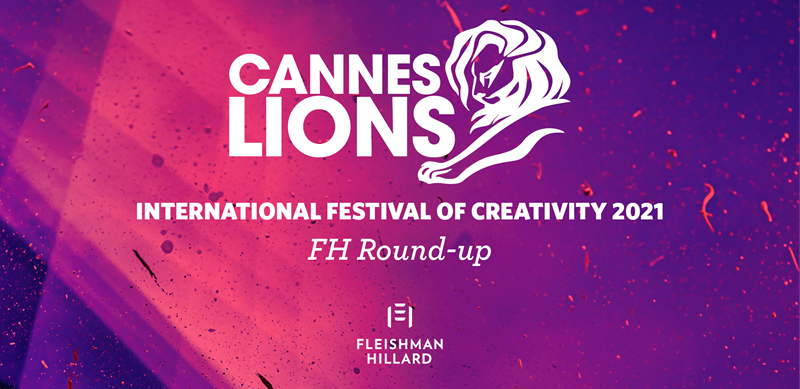FleishmanHillard Round-Up of virtual Cannes Lions 2021 - Day 4

Welcome to day four (and the final instalment) of your daily debrief from this year’s (virtual) Cannes Lions. 
In the final wrap up of the best content and campaigns that wowed from the Cannes International Festival of Creativity, we hit peak “I wish I’d thought of that”, so enjoy a bumper list of campaigns for you to peruse at your leisure, and be inspired by.
Rachel “Rom” O’Malley, senior creative.
Pedestal Project, Color of Change
As huge protests to bring down statues that represent racism swept through the United States in 2020, they left a sea of empty pedestals in their wake.
Color of Change, America’s largest online racial justice organisation wanted to repurpose the empty pedestals these statues once stood on, by giving people the power to choose what goes up on them.
The Pedestal Project is an augmented reality experience that lets people use their phone to place statues of racial justice leaders where symbols of racism once stood, using an Instagram filter.
So much that’s incredible about this – the juxtaposition of history and technology, and how technology takes what would’ve been a nice IRL activation and makes it sharper, smarter, more accessible and more shareable.
Adaptive deodorant, Innovation, Gold
Deodorant and other self-care CPG goods may seem utilitarian to most but it turns out the design is very difficult for those with physical challenges to open.
So Degree asked that very community to help them design a better one. After exploring 200 prototypes they created a newly designed deodorant that is easily opened and applied by all.
Love that they turned to those that live with physical challenges to help them reimagine brand products.
A New Jingle for a New Era, Gold Radio & Audio Lions
If you haven’t seen this already stop whatever you are doing and go listen.
The classic Good Humour ice cream truck melody has racist origins. So, Edelman set out to change it. And they didn’t just compose a new tune, they engaged American rapper of the Wu-Tang Clan, RZA.
Together they created a new, inclusive melody to be used across all ice cream trucks forevermore.
Whopper Detour, Burger King
There’s not much to explain about this – it’s so easy to grasp and the results speak for themselves.
Ultimately, Burger King wanted to drive app downloads. A fairly vanilla brief. What it did (and this is the genius bit) was geofence the restaurants of its biggest rival, McDonald’s.
If the Burger King app was downloaded within 600m of a McDonalds the downloader got a Whopper for ¢1, as well as directions to the nearest Burger King. It resulted in 1.5 million downloads. Yes, you read that right.
No Need to fly, German Rail
As the judges pointed out, if this brief landed on your desk you would probably sigh quite heavily and slump down a little further in your chair. A price promotion, how exciting! How likely to get you to Cannes! Not.
Well stop right there – because it didn’t just get Ogilvy to Cannes, it got Ogilvy a Lion. What the team did was take a mundane brief and use data to turn it into a really sexy campaign.
The campaign used an algorithm to match Getty images of locations in Germany, to famous tourist spots in the rest of the world.
It then used another algorithm to identify travel enthusiasts in Germany and serve them an ad of the two locations, along with a plane vs train price comparison.
It used tech in an innovative way, smashed every KPI, and resulted in an incredible ROI for German Rail. So next time you get a brief you think is dull, remember reading this and unleash your creativity.
Stranger Antennae, Netflix
In the olden days, people used to watch actual TVs with actual antennae on top.
Every country had its own hack for improving the reception (my family used to make me walk around the room holding the antennae until the picture improved.
And then they made me stand in the same spot until the programme was over), in Brazil, they added wire wool to the tip of each antenna.
Netflix used this cultural insight to create a campaign that fused nostalgia and technology – Stranger Antennae.
It was an app that warmed Brazilian fans up for the third season by giving them the first chance of a sneak peek at unreleased new Stranger Things scenes.
This could only be done by mimicking this old habit, of putting steel wool on TV antennas to improve the signal. With Stranger Antenna, fans had to put a steel wool pad near their phones in order to tune in to new ST3 scenes and exclusive content created only for the app.
An additional happy side effect of this campaign was that steel wool sales went up by 15% in Brazil.
Voices of Brussels, Brussels Public Transport, Radio and Audio
Families couldn’t connect in lockdown, and older people were particularly disadvantaged because of the digital divide.
Brussels public transport used its bus transport system to carry voice messages around the city, so people could bring a moment of joy to the loved ones they couldn’t see.
I have to admit I was slightly sceptical of this one at first because I was like “why wouldn’t you just use Zoom?”, but then they mentioned the insight of disadvantaged older generations and suddenly you have a very touching campaign that solves an isolation issue.
It’s just a shame it wasn’t picked up at scale across Europe.
Radio Recliner, Bridge Senior Living, Radio and Audio
This one got me right in the feels.
Isolation is always an issue for older people in care homes, memory care, assisted living and retirement villages. But suddenly they couldn’t even leave their rooms anymore.
On behalf of Bridge Senior living, Luckie created Radio Recliner, a pirate radio station run by real Resident DJs at retirement communities across the country, so they could stay connected while they were confined to their rooms.
Radio really came into its own in lockdown and trust in it has soared. But what’s so special about this campaign is that it transformed radio into the social media of an older and isolated generation.
JFK Moonshot, Gold Mobile
To celebrate the 50th anniversary of Apollo 11, the JFK Library created the first-ever live stream AR experience. Anyone could experience the launch from July 16, 1969, on July 16, 2019.
Using AR, over 110,000 people around the globe pointed their phones right where they were, and the actual launch appeared right before them. Such a cool way to create a historical shared experience in modern-day real-time.
Find Out More
-
Achieving Outsized Impact by Building Stronger Country Reputation
February 18, 2025


